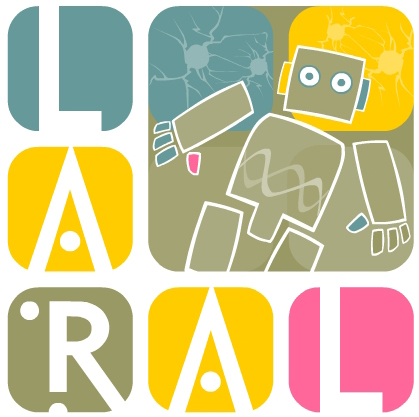RTD Research Projects
-
ITALK, Integrated Project funded by the Cognitive System Unit of the European Commission, 2008-2012
 The ITALK project aims to develop artificial embodied agents able to acquire complex behavioural, cognitive, and linguistic skills through individual and social learning. This will be achieved through experiments with the iCub humanoid robot to learn to handle and manipulate objects and tools autonomously, to cooperate and communicate with other robots and humans, and to adapt to changing internal, environmental, and social conditions. The project will lead to the development of: (a) new theoretical insights, models and scientific explanations of the integration of action, social and linguistic skills to bootstrap cognitive development, (b) new interdisciplinary sets of methods for analysing the interaction of language, action and cognition in humans and artificial cognitive agents, (c) new cognitively-plausible engineering principles and approaches for the design of robots with behavioural, cognitive, social and linguistic skills, and (d) robotic experiments on object manipulation and language with the iCub robot
The ITALK project aims to develop artificial embodied agents able to acquire complex behavioural, cognitive, and linguistic skills through individual and social learning. This will be achieved through experiments with the iCub humanoid robot to learn to handle and manipulate objects and tools autonomously, to cooperate and communicate with other robots and humans, and to adapt to changing internal, environmental, and social conditions. The project will lead to the development of: (a) new theoretical insights, models and scientific explanations of the integration of action, social and linguistic skills to bootstrap cognitive development, (b) new interdisciplinary sets of methods for analysing the interaction of language, action and cognition in humans and artificial cognitive agents, (c) new cognitively-plausible engineering principles and approaches for the design of robots with behavioural, cognitive, social and linguistic skills, and (d) robotic experiments on object manipulation and language with the iCub robot
-
SWARMANOID, STREP Project funded by the Future and Emerging Technology Unit of the European Commission, 2006-2009
 The main scientific objective of this research project is the design, implementation and control of a novel distributed robotic system that can successfully and adaptively act in human made environments. The system will be made up of heterogeneous, dynamically connected, small autonomous robots of three types: eye-bots, handbots, and foot-bots. Collectively, these robots will form what we call a swarmanoid. The Swarmanoid project succedes and builds upon the results obtained during the the Swarm-bots project.
The main scientific objective of this research project is the design, implementation and control of a novel distributed robotic system that can successfully and adaptively act in human made environments. The system will be made up of heterogeneous, dynamically connected, small autonomous robots of three types: eye-bots, handbots, and foot-bots. Collectively, these robots will form what we call a swarmanoid. The Swarmanoid project succedes and builds upon the results obtained during the the Swarm-bots project.
-
ICEA, Integrated Project funded by the
IST Cognitive Systems Unit of the European Commission, 2006-2009
 This project aims at building an artificial rat with capabilities that Integrate Cognition Emotion and Action. LARAL’s research focus on the development of a repertoire of actions, and the composition of them to build more complex behaviours, based on experience and curiosity, on prediction at multiple levels of time and space abstraction, on planning, and on the role that emotion plays in all these processes.
This project aims at building an artificial rat with capabilities that Integrate Cognition Emotion and Action. LARAL’s research focus on the development of a repertoire of actions, and the composition of them to build more complex behaviours, based on experience and curiosity, on prediction at multiple levels of time and space abstraction, on planning, and on the role that emotion plays in all these processes.
-
ECAGENTS, Integrated Project funded by the Future and Emerging Technology Unit of the European Commission, 2004-2008
 This project aims at developing a new generation of embodied agents that are able to interact with the physical world and to communicate between them and with other agents (including humans). LARAL is the coordinator of the project, and its research focuses on the fundamental conditions needed for the emergence of communication between mobile robots (e.g. shared meanings of signals and communication protocols), the relation between language and thought, and the exploitation of communication in distributed networks of embodied electronic devices .
This project aims at developing a new generation of embodied agents that are able to interact with the physical world and to communicate between them and with other agents (including humans). LARAL is the coordinator of the project, and its research focuses on the fundamental conditions needed for the emergence of communication between mobile robots (e.g. shared meanings of signals and communication protocols), the relation between language and thought, and the exploitation of communication in distributed networks of embodied electronic devices .
- SWARMBOTS, STREP Project funded by the Future and Emerging Technology Unit of the European Commission, 2002-2005
 This project, inspired by social insects, is based on robots capable of physically assembling and solving tasks that cannot be solved by single robots. LARAL focuses on how controlling physically linked robots that have to coordinate their motion, search and pursue light targets, move heavy objects, and overcome holes and hills. These problems are tackled with neural controllers evolved with "collective" genetic algorithms and with physical features of the robots that exploits self-organising principles such as positive and negative feedback.
This project, inspired by social insects, is based on robots capable of physically assembling and solving tasks that cannot be solved by single robots. LARAL focuses on how controlling physically linked robots that have to coordinate their motion, search and pursue light targets, move heavy objects, and overcome holes and hills. These problems are tackled with neural controllers evolved with "collective" genetic algorithms and with physical features of the robots that exploits self-organising principles such as positive and negative feedback.
-
MINDRACES, STREP Project funded by the Cognitive System Unit of the European Commission, 2004-2007
 This project aims at studying and modelling the different roles that different types of anticipation and prediction can play in human and animal cognition. The research of LARAL focuses on the role of anticipation in learning sensory-motor behaviours and of the integration of perceptual information in time.
This project aims at studying and modelling the different roles that different types of anticipation and prediction can play in human and animal cognition. The research of LARAL focuses on the role of anticipation in learning sensory-motor behaviours and of the integration of perceptual information in time.
-
ROBOCARE, Project funded by the Italian Ministry of Research and University (MIUR), 2002-2006
 This project aims at building and controlling robots capable of giving assistance to human users. LARAL develops customised sensors for commercial robots, and uses evolutionary techniques to build neural networks to control them, in order to tackle the problem of localisation and following of human subjects.
This project aims at building and controlling robots capable of giving assistance to human users. LARAL develops customised sensors for commercial robots, and uses evolutionary techniques to build neural networks to control them, in order to tackle the problem of localisation and following of human subjects.

